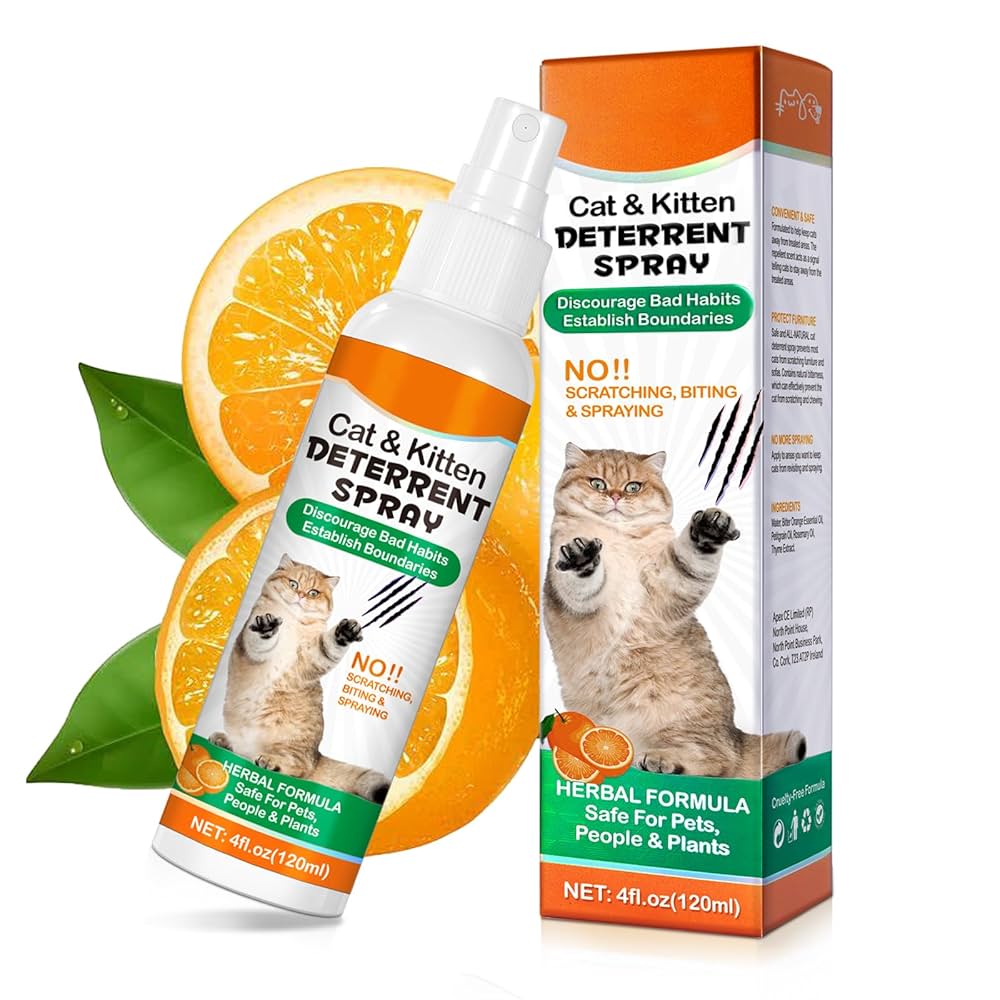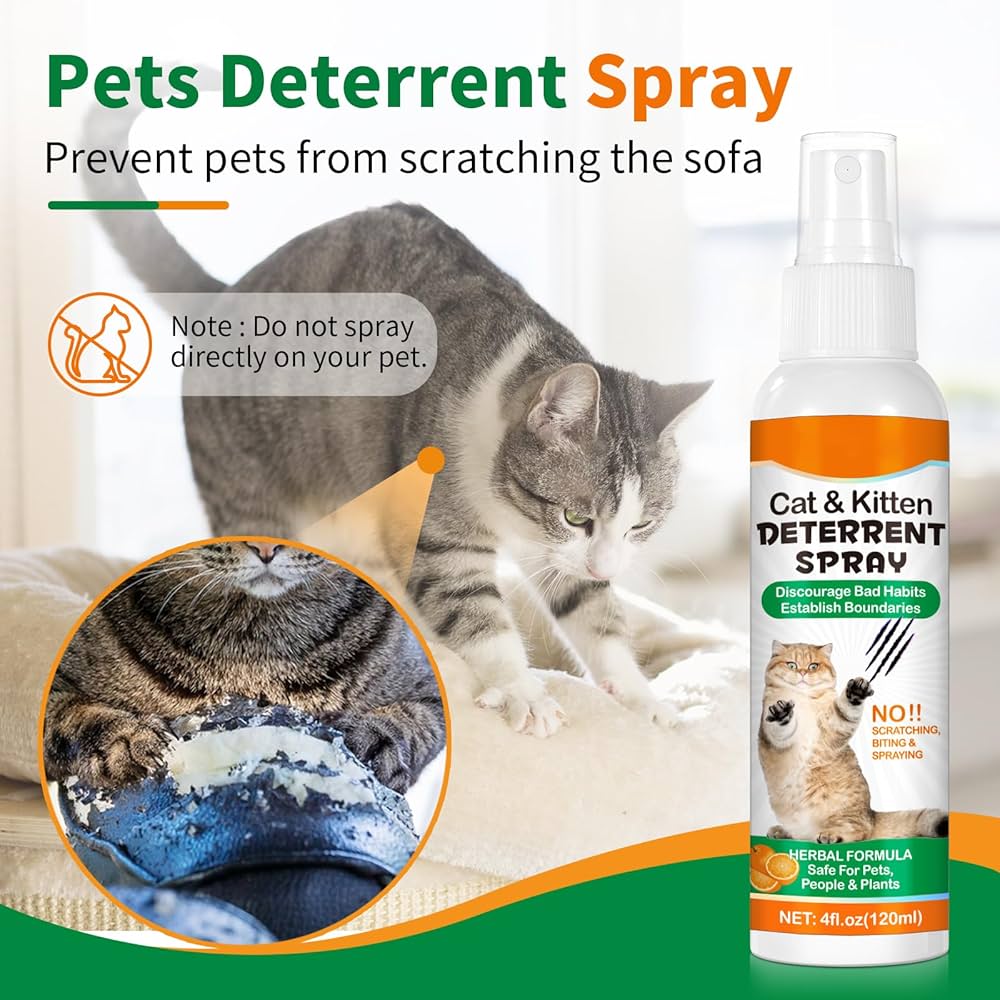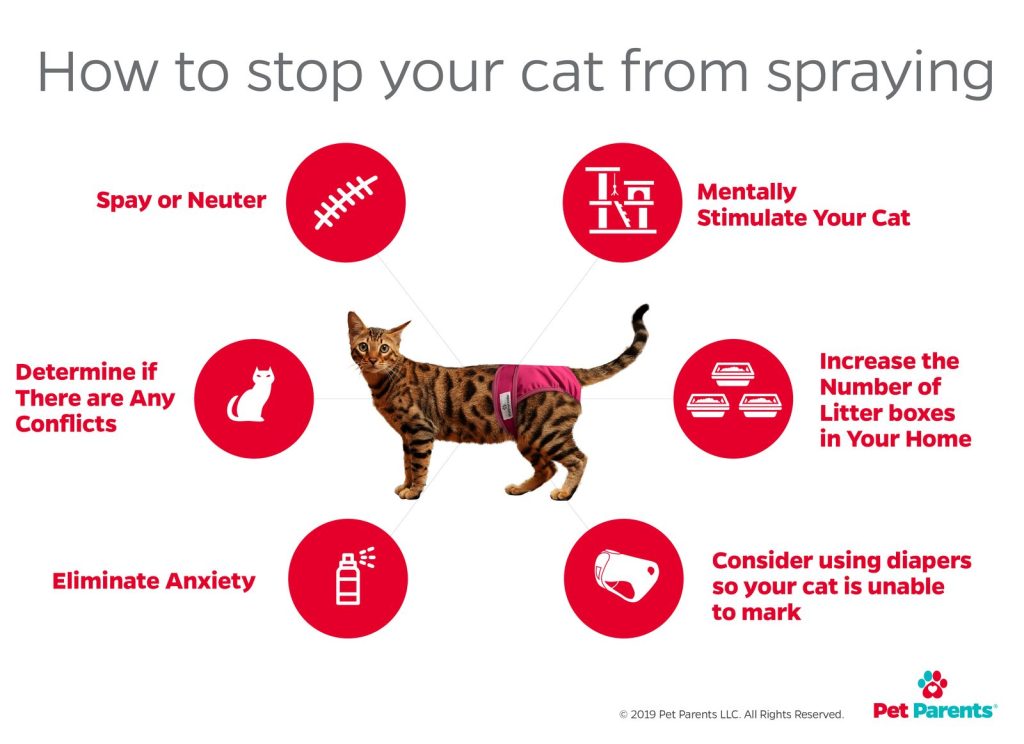Are you at your wit’s end with your cat spraying around the house? You’ve scrubbed, you’ve scolded, and yet, your furry friend just won’t stop.
It’s not only frustrating but can also feel like a mystery you can’t solve. You’re not alone in this struggle, and there’s hope. Understanding why your cat is behaving this way is the first step towards a peaceful, odor-free home.
In this guide, you’ll discover simple, effective strategies to help your cat break the spraying habit. With a few adjustments and insights, you can restore harmony to your home. Ready to reclaim your living space and strengthen your bond with your cat? Let’s dive in and explore the solutions that really work.

Credit: www.amazon.com
Why Cats Spray Indoors
Understanding why your cat sprays indoors is the first step toward stopping this behavior. Cats don’t spray just to annoy you; they have reasons rooted in their instincts, health, and environment. Identifying the cause helps you address the problem effectively and keep your home fresh and stress-free.
Behavioral Causes
Cats often spray to communicate feelings of anxiety or stress. Changes in their environment—like new furniture, a new pet, or even different visitors—can trigger this behavior. Have you noticed your cat spraying after a move or when another animal is introduced? It’s their way of coping with uncertainty.
Sometimes, spraying is a sign your cat feels ignored or bored. Adding more playtime and attention can reduce their need to mark through spraying. Are you spending enough quality time with your feline friend?
Medical Issues
Not all spraying is behavioral. Sometimes, it signals health problems like urinary tract infections or bladder issues. If your cat suddenly starts spraying, a vet visit is crucial to rule out pain or discomfort.
Ignoring medical causes can make the problem worse and cause unnecessary suffering. Have you checked with your vet to ensure your cat’s health is in top shape?
Territorial Marking
Spraying is a natural way for cats to mark territory. This is especially common in multi-cat households or neighborhoods with many outdoor cats. Your cat leaves scent markers to claim areas and reduce conflict.
If your cat sprays near windows or doors, it’s likely responding to outside cats. Blocking views or using deterrents can help. Have you noticed where your cat sprays most often? Targeting these spots can make a big difference.
Identifying Spraying Vs. Urination
Understanding the difference between spraying and urination is key to solving your cat’s behavior. Both involve urine but have distinct reasons and signs. Knowing which one your cat is doing helps you address the problem correctly. This section explains how to identify spraying and when urination might signal health issues.
Signs Of Spraying
- Cat stands with tail raised and quivers slightly.
- Sprays small amounts of urine on vertical surfaces.
- Usually targets walls, furniture, or doors.
- Often happens outside the litter box but near its edges.
- Common in unneutered males but can occur in females too.
- Usually has a strong, pungent smell.
Signs Of Urinary Problems
- Cat urinates large amounts on horizontal surfaces.
- May strain or cry while urinating.
- Frequent trips to the litter box with little urine.
- Urine may appear cloudy or bloody.
- Cat licks the genital area excessively.
- Behavior changes like hiding or irritability.
Effective Cleaning Techniques
Cleaning sprayed areas properly stops cats from spraying again. Cats return to spots that still smell like urine. Effective cleaning removes both the stain and the odor. This helps keep your home fresh and your cat calm. Use the right products and techniques to clean sprayed areas fully.
Removing Odors Completely
Use enzymatic cleaners to break down urine molecules. These cleaners target the odor at its source. Avoid regular household cleaners that mask the smell. Thorough cleaning means soaking the area well. Let the cleaner sit for 10 to 15 minutes. Blot the area with a clean cloth. Repeat if needed to ensure no smell remains.
Safe Cleaning Products
Choose pet-safe cleaners to protect your cat and home. Look for products labeled non-toxic and safe for pets. Avoid bleach, ammonia, and harsh chemicals. These can irritate your cat’s nose and skin. Natural options include vinegar diluted in water or baking soda. Test any cleaner on a small hidden spot first. Always air out the room after cleaning.

Credit: www.amazon.com
Litter Box Solutions
Solving cat spraying often starts with litter box solutions. Cats spray to mark territory or avoid dirty boxes. Fixing litter box issues helps stop this behavior. Focus on the type of litter, box location, and cleanliness. Each factor affects your cat’s comfort and trust in the box.
Choosing The Right Litter
Pick litter that feels soft on your cat’s paws. Unscented, clumping litter works best for many cats. Avoid strong fragrances; they can scare your cat away. Try different types to find the one your cat prefers. Keep the litter depth around two inches for comfort.
Proper Litter Box Placement
Place the box in a quiet, low-traffic area. Avoid spots near loud appliances or busy rooms. Cats need privacy but also easy access to the box. Avoid placing boxes near their food or water bowls. If you have multiple cats, provide extra boxes in different spots.
Maintaining Cleanliness
Clean the litter box daily by scooping waste. Wash the box with mild soap once a week. Avoid strong-smelling cleaners that might deter your cat. Fresh litter helps reduce odors and keeps your cat happy. A clean box encourages your cat to use it regularly.
Behavioral Adjustments
Behavioral adjustments are key to stopping your cat from spraying indoors. Cats often spray as a reaction to discomfort or environmental triggers. Changing their behavior by addressing these triggers can lead to lasting improvements.
Reducing Stress And Anxiety
Stress is a common cause of spraying. Try to identify what might be stressing your cat—new pets, loud noises, or changes in routine.
Create a calm environment by keeping a consistent schedule for feeding and playtime. Consider giving your cat a quiet, safe space where they can retreat when feeling overwhelmed.
Have you noticed if your cat sprays more during certain events? Observing these patterns helps you reduce anxiety triggers effectively.
Providing Enrichment And Play
Boredom can lead to spraying as cats look for ways to mark their territory. Keep your cat mentally and physically stimulated with toys, climbing trees, and interactive play.
Simple activities like puzzle feeders or daily play sessions can make a big difference. This not only distracts your cat but also strengthens your bond.
Try rotating toys to keep things fresh and exciting. What new game or toy might your cat enjoy today?
Using Pheromone Sprays
Pheromone sprays mimic the natural scent markers cats use to feel safe. Using these sprays around your home can reduce your cat’s urge to spray.
Apply pheromone sprays near problem areas like doorways or favorite spraying spots. Be consistent—regular use helps your cat feel more secure over time.
Have you tried pheromone products yet? Many cat owners find them a simple and effective tool to calm their pets.

Credit: www.amazon.com
When To Consult A Veterinarian
Noticing your cat spraying inside the house can be frustrating, but it’s important to consider when this behavior might signal a deeper health issue. Consulting a veterinarian is crucial if the problem persists or worsens despite your efforts. Knowing when to seek professional help can save your cat from discomfort and prevent further damage to your home.
Health Checks
Start by scheduling a thorough health check with your vet. Spraying can be a sign of urinary tract infections, bladder stones, or other medical problems that cause discomfort. Your vet may perform urine tests, blood work, or physical exams to identify any underlying issues.
Have you noticed other signs like frequent licking, blood in urine, or changes in appetite? These symptoms often accompany health problems linked to spraying. Early detection can make treatment easier and more effective.
Possible Treatments
Once the vet identifies the cause, they can recommend appropriate treatments. This might include antibiotics for infections, special diets for urinary health, or medications to reduce stress and anxiety. Sometimes, behavioral therapy combined with medication is necessary to manage spraying.
Remember, treatment plans are tailored to your cat’s specific needs. You might need to adjust your approach based on how your cat responds. Don’t hesitate to follow up with your vet if spraying continues or new symptoms appear.
Frequently Asked Questions
Why Is My Cat Spraying Inside The House?
Cats spray to mark territory, feel stressed, or due to medical issues. Identifying the cause helps in effective treatment and prevention.
How Can I Stop My Cat From Spraying Indoors?
Clean marked areas thoroughly, reduce stress, provide litter boxes, and use pheromone sprays. Consult a vet for persistent spraying.
Does Neutering Or Spaying Reduce Cat Spraying?
Yes, neutering or spaying significantly lowers spraying behavior by reducing territorial instincts and hormone-driven marking in cats.
What Household Cleaners Remove Cat Spray Odor Effectively?
Use enzymatic cleaners designed for pet odors. They break down urine compounds and prevent re-marking by cats.
Conclusion
Stopping your cat from spraying takes patience and care. Create a calm space for your cat to feel safe. Clean sprayed areas with special cleaners to remove odors. Use scratching posts and toys to reduce stress. Watch your cat’s behavior for signs of discomfort.
Consult a vet if spraying continues or worsens. Small steps can lead to big changes over time. Keep trying and stay consistent for best results. Your cat can learn to stop spraying inside the house.

